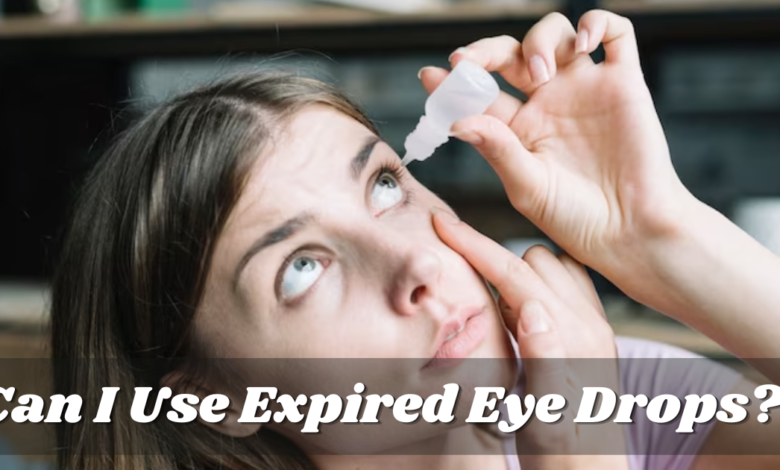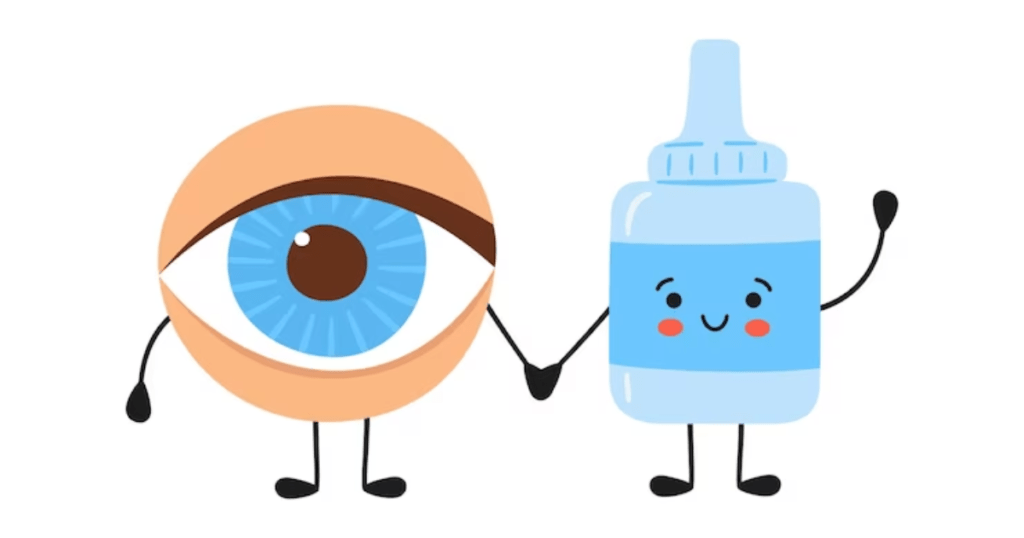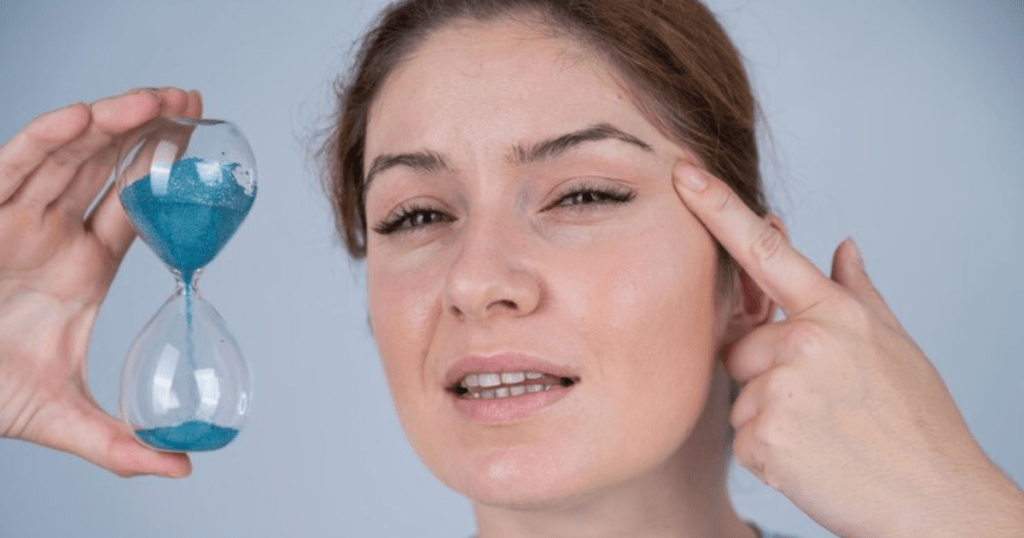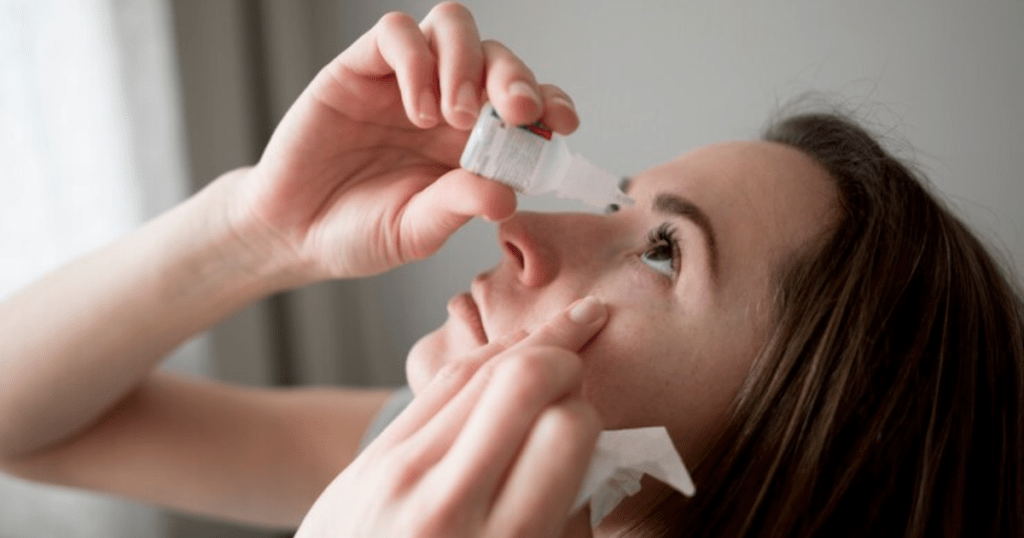Can I Use Expired Eye Drops?

Eye drops are often used to treat a variety of eye disorders, including dryness, redness, and allergies. However, it is critical to check their safety and effectiveness before using them, especially if they have beyond their expiration date. In this post, we will look at whether using expired eye drops is safe and what the risks are.
What Are The Different Types of Eye Drops?
1- Lubricating Eye Drops
Lubricating eye drops, often known as artificial tears, are the most popular type of eye drop. They are intended to replicate the natural tears generated by the eyes while providing relief from dryness and irritation.
Lubricating eye solutions can help relieve symptoms caused by environmental factors including dry air, wind, or too much screen time.
2- Allergy Eye Drops
Allergy eye drops, commonly known as antihistamine eye drops, are designed to alleviate symptoms caused by ocular allergies such as itching, redness, and watery eyes.
These eye drops operate by preventing the release of histamines, substances that cause allergic reactions. Depending on the intensity of the allergy symptoms, allergy eye drops can be purchased over-the-counter or via prescription.
3- Prescription Eye Drops
Prescription eye drops are drugs that must be prescribed by a healthcare physician. These eye drops are used to treat a variety of eye problems, including glaucoma, dry eye syndrome, and infections.
Prescription eye drops contain active components that address specific eye disorders and must be closely monitored by a healthcare practitioner to ensure safety and efficacy.
4- Redness-Relief Eye Drops
Redness-relief eye drops, also called vasoconstrictors, are intended to lessen the appearance of redness in the eyes caused by irritation or small eye infections. These eye drops operate by restricting the blood vessels in the eyes, reducing redness momentarily.
However, it is critical to use redness-relief eye drops judiciously and avoid long-term use, as they might produce rebound redness if taken in excess.

What Do Expiration Dates Mean?
Expiration dates for pharmaceutical products, particularly eye drops, serve as a guidance for both consumers and healthcare professionals. They provide the date by which the producer assures the product’s safety and potency when stored appropriately. After this date, the manufacturer cannot guarantee the product’s efficacy or safety.
Why Do Eye Drops Expire?
Eye drops include active chemicals, which might degrade over time owing to variables such as light, air, and temperature changes. As a result, the efficacy of the eye drops may decrease, rendering them less helpful in treating eye diseases.
How Long Do Eye Drops Last?
The lifetime of eye drops is determined by a variety of factors, including the type of eye drop, the precise formulation, how frequently they are used, and how they are maintained. Most eye drops have an expiration date printed on the package. Once opened, the shelf life varies.
Preservative-free eye drops typically have a shorter shelf life after opening, ranging from 1 to 3 months, whereas preserved eye drops can persist for up to 6 months.
However, to maintain their effectiveness and safety, follow the manufacturer’s storage and expiration dates directions.

Can I Use Expired Eye Drops?
No, it is not good to use expired eye drops. Eye drops that have above their expiration date might not work properly or may cause eye irritation. It’s like trying to feel better with old medicine, it may not work well. To ensure that your eyes feel better, apply eye drops that have not expired. If your eye drops have expired, it is best to replace them.
What Are The Risks of Using Expired Eye Drops?
1- Reduced Efficacy
One of the most significant dangers of using expired eye drops is decreased efficacy. Over time, the active components in eye drop formulations might degrade, reducing their effectiveness.
As a result, utilizing expired eye drops may not provide the desired relief for your eye problem, such as dryness, redness or irritation. This can make you feel worse and cause your symptoms to take longer to resolve.
2- Contamination and Infection
Expired eye drops are also more likely to be contaminated, posing major health dangers. As the solution’s preservation chemicals degrade, bacteria, fungi, and other pathogens may develop within the bottle.
Contaminated eye drops can transfer bacteria straight into the delicate ocular tissues, raising the risk of eye diseases such conjunctivitis (pink eye) and keratitis.
3- Irritation and Allergic Reactions
Using expired eye drops can potentially cause irritation and allergic reactions in some people. As the solution’s chemical composition changes over time, it may become more acidic or alkaline, causing discomfort during application.
Furthermore, the breakdown components of expired eye drops may cause allergic reactions in sensitive people, resulting in symptoms including itching, redness, swelling, and tears.
4- Worsening of Underlying Conditions
Using expired eye drops can sometimes worsen rather than improve underlying eye issues. For example, if you use expired eye drops to treat chronic dry eye syndrome, the product’s lessened efficiency may result in insufficient lubrication for your eyes. This can cause increased dryness, discomfort, and potential damage to the ocular surface over time.

What Should You Do If You’ve Used Expired Eye Drops by Mistake?
If you have accidentally used expired eye drops, it is critical that you act quickly to reduce any potential threats to your vision. Here’s what you need to do:
- Discontinue Use: To avoid future exposure to potentially dangerous ingredients, stop using expired eye drops immediately.
- Flush Eyes: Rinse your eyes completely with clean, lukewarm water to remove any remaining eye drop solution and limit the risk of irritation or contamination.
- Get Medical Guidance: If you develop any adverse effects, such as redness, irritation, itching, swelling, or discharge, you should seek medical attention right once. Contact your eye care provider or a healthcare expert for advice on how to manage your symptoms and whether additional treatment is required.
- Remove the Product: Properly dispose of expired eye drops to prevent future unintentional use. Follow local legislation for pharmaceutical waste disposal or get advice from your pharmacist on safe disposal techniques.
- Check Symptoms: Keep track of any changes in your eye health or symptoms over the next few days. If your symptoms worsen or persist, visit a doctor for further examination and treatment.
By taking these proactive steps, you may help reduce the hazards connected with using expired eye drops while also protecting your eye health. Remember to always check your eye care products’ expiration dates and follow correct storage and usage directions to guarantee their safety and performance.
More from Author: What Happens When Scab Falls Off After LEEP
Takeaways
In conclusion, utilizing expired eye drops can endanger your eye health and may not deliver the required relief from symptoms. Before using eye drops, be sure to verify the expiration date and look for symptoms of degradation.
Consultation with a healthcare practitioner and correct disposal of expired goods are important steps in maintaining your eye health and safety.
Frequently Asked Questions
What happens if I use expired eye drops?
If you use expired eye drops, they may not operate properly. They may lose effectiveness and fail to relax your eyes or treat your symptoms appropriately. It’s like taking old medicine, which may not help you feel better.
Can expired eye drops hurt my eyes?
Expired eye drops may cause discomfort or irritation, as their contents may vary over time. To avoid issues, use eye drops that have not expired, as they are unlikely to cause direct harm.
How can I tell if my eye drops are expired?
Eye drop bottles usually have an expiration date printed on the label or bottom. If you’re not sure, look for changes in color, consistency, or scent; strange appearances or smells may suggest inactivity.
Can I still use eye drops if they’re just a little expired?
It is not advisable to use eye drops that have passed their expiration date, even if only a little. The expiration date is there for a reason to ensure the drops’ safety and effectiveness. Using expired drops, even marginally, may result in less effective treatment or discomfort.
What should I do with expired eye drops?
If you have expire eye drops, throw them . You may typically do this by following the instructions on the bottle or contacting your pharmacist. Do not flush them or pour them down the sink because they may harm the environment. It is best to be safe and purchase a new, unexpired bottle of eye drops for your eyes.





I don’t think the title of your article matches the content lol. Just kidding, mainly because I had some doubts after reading the article.
Your point of view caught my eye and was very interesting. Thanks. I have a question for you.
Your article helped me a lot, is there any more related content? Thanks!
Your article helped me a lot, is there any more related content? Thanks! https://accounts.binance.com/ph/register-person?ref=B4EPR6J0